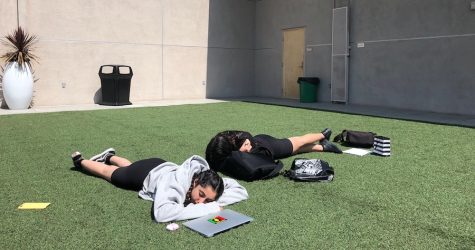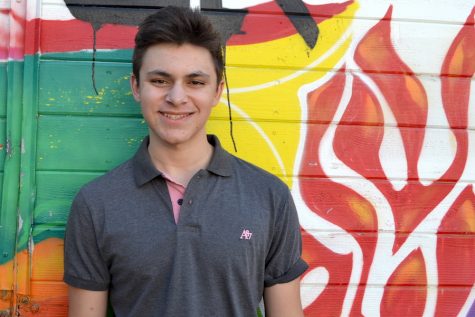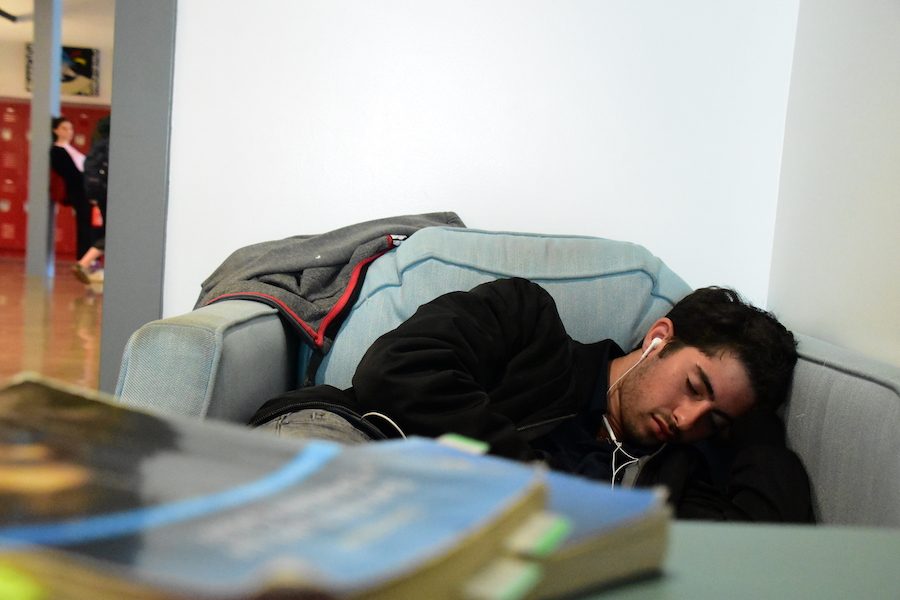Late-start school day gets a tryout
Reactions are mixed to late day, which would not be daily but quarterly or monthly. Research says it could help student health and attention.
REST: :Junior Noah Hertzberg catches some zz’s on a second-floor couch May 31. BP photographers had no difficulty finding tired students to take pictures of for this story.
Shalhevet tested a 90-minute-later school start May 1 in what officials called an “alpha test” of one of various options to improve student health, rest and work-life balance.
The “alpha test,” as Principal Mr. Daniel Weslow dubbed it in an email announcing the one-day experiment, included separate follow-up surveys for students, parents and faculty that showed mixed reactions to the idea.
Mr. Weslow said it was the first step towards seeing if something like this might work.
“For the last four years, we have talked as an educational leadership team, as well as received feedback from parents on sleep studies and how sleep impacts teenagers,” Mr. Weslow said in an interview.
He said the school looked at what other institutions were doing to address the situation in which “teenagers are over-programmed and staying up too late and not getting the appropriate rest they need to kind of have work-life balance.” An alpha test is performed as an experiment early on, whereas a beta test catches errors in a program that is running.
Other options that the administration considered included giving students a week off of homework, quizzes, and tests each semester, Mr. Weslow said.
“I think there’s value in kind of alpha-testing or even beta-test- ing these ideas from time to time,” Mr. Weslow said, “to ensure that we maximize the student experience both from a teaching and learning standpoint, but also from a human development and wellness standpoint.”
The reason for testing a later starting time is that studies have shown that for teenagers, it’s not just a matter of how much sleep they get, but when they get it.
The American Academy of Pediatrics (AAP) has said that daily late start times have positive effects on adolescents.
“Studies comparing high schools with start times as little as 30 minutes earlier versus those with later start times demonstrate such adverse consequences,” the AAP stated in a 2014 article, “such as shorter sleep duration, increased sleepiness, difficulty concentrating, behavior problems, and absenteeism.”
Student reaction to the test was varied, and seemed influenced partly by how much they missed Flex period — which was cancelled for the day — and how far the person had to commute. Also, some benefits were not realized because the test was only for one day.
In all, 152 students and 33 faculty voted in separate surveys using Google Forms. About 55 percent of students gave the day a positive rating, about 47 percent said it impacted their sleep positively the night before the late start.
As for their sleep the next night, about 38 percent said the late start impacted it negatively, 33 percent gave it a neutral rating, and about 30 percent said it helped.
Some who support late start said that because the test was for only one day, it didn’t help their sleep at all.
“The schedule doesn’t work if the next day it’s not the same thing,” said junior Anna Weiss. “When you’re ending later, you’re going to sleep later, and you don’t really end up saving any time or saving any sleep.”
Anna Weiss, who lives near school, said supported the idea behind the test run, but said that without consistency, a late start would be pointless.
The problem, she said, is with the morning after.
For example, Anna has choir practice after school on Wednesday, the day of the week the late start was tested. Practice finished later so she got home later — at 7:45 p.m. instead of 6:50.
That meant that with homework and studying, she went to bed later than normally does.
That would have been fine, she said, if the next day the same late-start schedule had repeated. But she had to be up at her usual time for regular-day start on Thursday.
“You end up with the same pattern” of late bedtime and too-early rising, Anna said.
“I don’t know if it should be once every other week or once every few weeks,” she said, “but once a month — it’s like it’s pointless.”
Mr. Weslow partly agreed.
“All the research that is put out there, what does it show?” Mr. Weslow said. “It shows that consistency is key, that a rhythm or pattern is key, to really improving and bringing about change in this arena. And I know it’s contradictory to what the research says, but I think we wanted to try it as an alpha test just to see if it’s worthwhile to explore down the line.”
Starting late regularly would mean “drastically changing the school schedule,” the principal said, “and to be honest, I didn’t feel like we were ready to kind of make that jump and that level of commitment.”
The Boiling Point could not obtain results from the parent survey. But faculty rated the late start less well than students: 42.5 percent thought it would be nice to have monthly, and 21.2 percent said “never.” Smaller percentages favored weekly, bi-weekly or quarterly.
Dean of Students Rabbi Ari Schwarzberg said said his first-period class felt stronger than usual on the day of the experiment.
“Everyone was present, it was alive, people weren’t fatigued, they had already had some food in their belly,” Rabbi Schwarzberg said.
Freshman Anya Mendelson had expected to like the late start, but she missed her free periods, which had been cut from the schedule so the late dismissal wouldn’t be as late as the late start was. School was out at 5 instead of 4:30.
Flex period, normally 40 minutes, was cancelled, and classes were shortened by 10-15 minutes.
“I know my classes were shorter,” said Anya, “but it made everything feel a lot longer because I just went from class to class, and we didn’t have any of the frees, which give me a break in between all the classes.”
“The day was supposed to feel shorter but it just ended up feeling a lot longer.”
Driving and carpools were an issue for many.Sophomore Hilla Lasry, who lives in North Hollywood, said it took longer for her to get home than if if she had left school at 4:35, the usual end time.
“Five o’clock…is the exact time of traffic hour for people going to the Valley and stuff,” said Hilla.
According to a Boiling Point report on Shalhevet commuters last year, in May 2018 more than half of students live in Beverlywood, Pico-Robertson, Westwood, Beverly Hills, Miracle Mile or Carthay Circle. Their commutes are 20 minutes or less, the report found.
But there were 15 student households in the San Fernando Valley, along with two each in Westchester, Venice and Brentwood and one each in Glendale, Bel Air and the Mulholland canyons. Together they accounted for 23 students.
Their commutes ranged from 45 minutes to more than an hour-and-a-half. They accounted for 23 students.
Junior Noah Hertzberg, who also lives in the Valley, got home after 6:20 p.m. the day of the alpha test.
“It negatively affects anyone living in the Valley,” said Noah. “I’m in the car for not only the usual 40 minute drive, now it’s an hour-and-a-half.”
Mr. Weslow acknowledged the carpool issue and said it would be an important consideration.
“That’s a significant data point for me,” said Mr. Weslow.
Rabbi Schwarzberg said the school’s mission is multi-faceted, making scheduling inherently difficult. “We have dual curriculum,” Rabbi Schwarzberg
said, “and we have a responsibility to have davening at the right time every single day. So you can’t do everything — you can’t have a late start, have davening, and not end the school super late, and have the same length of periods that we have normally.”
He said a late start would mean the school day would have to end later.
Perhaps it could be looked at as a special day, he besaid, something for students to look forward to in the humdrum of school. Rabbi Schwarzberg said that realistically, he sees a late start happening eight to 10 times a year.

TIRED: Freshmen dozed on the turf May 31. Studies suggest that schools that start 30 minutes later see less absenteeism and fewer behavior problems.
“It’s a dynamic institution, it’s not same old same old every day,” Rabbi Schwarzberg said, “so this is another thing that can help that.”
Dr. William Walton, Math Department chair and Dean of Curriculum and Instruction, has studied some of the research on schedules and sleep. He favors getting rid of seasonal time changes for daylight saving, for example, saying a single time schedule should be used all year long because time changes are disruptive.
Asked about a late start schedule at Shalhevet, Dr. Walton said he would love to wake up and come to school later, but that others don’t really have that option.
“In LA you’ve got the commute problem and there’s people coming from very far away,” Dr. Walton said, “so it’s one of those things of like no time is going to make everybody happy.
“Based off of what the research says, you would just decide to do a late start, right? But that’s not the only factors that are being taken into consideration.”
Milken Community Schools, he said, decide their start time in coordination with other schools, to mitigate traffic.
“All those schools had to coordinate their start times because you couldn’t have them all starting at the same time,” he said. “It really has nothing to do with the research.”
Team sports, other co-curriculars and Hashkama minyan (early-morning prayer) are also involved, as well as commutes.
But he likes the way Shalhevet’s schedule is currently set up, with block periods that rotate to different times on different days, because it helps with students’ lethargy.
“In terms of the research saying the students do better with more sleep than at later times of the day — our rotating schedule partially addresses that,” Dr. Walton said.
That meanas each class can experience a range of student behavior according to the time of day, he said.
“I think being able to experience things at different times is great,” he said. “We already kind of do that.”
For now, Mr. Weslow said the educational leadership team “is reviewing the data and discussing what pathway” to take for the upcoming school year.
“The follow-up survey data is fascinating,” the principal said, adding that he was still reading through it and would be sending out an update.

Sam Rubanowitz currently serves as Executive Producer of the Talking Point podcast, as well as Outside News Editor and Chief Video Editor of the Boiling Point. Sam joined as a staff writer at the start of 11th grade, contributing artwork also and winning awards for both writing and illustration. Last year he became BP’s first traveling correspondent, flying to Arizona to follow a Los Angeles synagogue group volunteering to help migrants arriving in the U.S. from Central America. He has written extensively on immigration and other political and governmental topics.
After taking the Computer Science course offered at Shalhevet in his junior year, Sam fell in love with programming and took his passion further by interning as a programmer at California Association of Realtors® last summer.
He is a member of three committees on the Del Rey Neighborhood Council and enjoys problem-solving and thought-provoking discussions.









